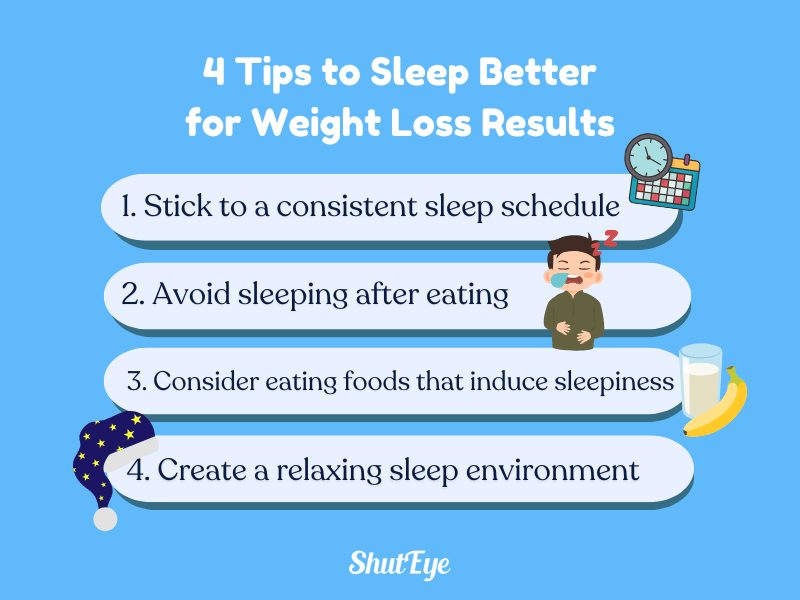


Do you find it hard to lose weight even with following different diets and exercising more? Did you know that besides eating healthily and doing physical activity, sleep can also affect your ability to lose weight?
Approximately 1 in 3 adults do not get enough sleep each day [1]. This type of insufficient sleep can lead to weight gain for several reasons. Keep reading to find out all about the effects of sleep and weight loss effectiveness.
Getting sufficient sleep is important for maintaining healthy physical, mental, and emotional well-being. Sleep deprivation or sleep loss not only negatively impacts your ability to learn and recall information but it also increases the risk of obesity, impacting your ability to lose weight [2].
When you have a short sleep duration, it increases the hormone ghrelin, which triggers hunger. This results in increased food intake to combat the fatigue and stress on your body from lack of sleep.
This can undermine your best dietary efforts to reduce weight, therefore getting between 7 to 9 hours of sleep is often suggested for overall health and well-being.
Here are four ways that poor sleep is associated with weight loss, based on sleep research and the relationship between sleep and weight [3]:

Sleep disorders can significantly impact weight management by disrupting the body’s natural metabolic processes and hormonal balance.
For instance, sleep disorders such as insomnia, sleep apnea, and restless leg syndrome can contribute to reduced sleep duration, altering the levels of the appetite-regulating hormone and metabolism [2].
Obstructive sleep apnea (OSA) is a sleep disorder where your breathing stops during sleep. This may lead to frequent waking and an overall poor sleep quality. It also causes changes in your hormone levels, leading to increased hunger and cravings. This imbalance often results in weight gain [6], [7].
Sleep can be particularly beneficial in various ways if you are looking to lose weight. Here are some benefits of sleep and how it helps you to shed those pounds.
Getting sufficient sleep can help to reduce caloric intake. In a clinical sleep trial published in 2022, participants’ sleep duration was tracked to evaluate whether sleep affects caloric intake.
Results found that participants who had at least 8.5 hours of sleep per night reduced their caloric intake by an average of 270 calories per day [8]. This study concluded that getting adequate sleep is important for appetite regulation and can help those wanting to reduce their body weight.
Stress and sleep are deeply interconnected. High stress levels can cause poor sleep and insufficient sleep can raise cortisol levels.
According to a survey by the American Psychological Association, 43% of American adults reported that stress had increased when they had poor and inadequate sleep [9].
Elevated cortisol levels can also trigger unhealthy eating behaviors and weight gain, potentially leading to obesity. Conversely, better sleep can help reduce stress, improve mood, and enhance resilience to stressful situations, supporting healthier weight management [10].
Quality sleep is essential for maintaining a healthy metabolism, which is key to effective weight management.
During deep sleep, your body works to repair and regenerate tissues, build muscle, and regulate metabolic processes. Not getting enough sleep throws off your body’s circadian rhythm, causing an imbalance in metabolism and overall energy. This imbalance makes it harder to lose weight and increases the chances of weight gain [11].
Ensuring that you get high-quality sleep helps to support your body’s metabolic process, making it easier to burn calories, build lean muscle, and maintain a healthy weight.

How can you effectively incorporate strategies to improve your sleep for better weight loss results? Here are four key strategies to consider:
1. Establish a consistent sleep schedule: Create a consistent sleep schedule by going to bed and waking up at the same time every day, including weekends. This helps to regulate your body’s sleep-wake cycle, contributing to healthy weight loss in the long term. Find the best time to sleep by using our sleep calculator.
2. Do not sleep after eating: Try not to sleep right after eating as this can cause weight gain. When you eat just before you’re about to sleep, there’s a good chance your body will not be able to burn the calories effectively in time.
3. Consider eating foods that induce sleepiness: Another method to try if you can’t seem to fall asleep is to eat foods that are rich in melatonin. This increased melatonin can help to promote restfulness by regulating the body’s sleep-wake cycle.
4. Create a relaxing sleep environment: Lastly, it is important to ensure that your environment is conducive to sleep. Make sure that your sleep environment is comfortable by keeping it cool, dark, and quiet. You may also use sleep sounds or essential oils to help you sleep better.
In conclusion, sleep plays a crucial role in weight loss. Insufficient sleep can lead to hormonal imbalances and increased appetite. Consequently, this results in poor food choices, disrupted metabolism, and increased fat retention.
By prioritizing quality sleep, you can optimize your weight loss efforts. To learn how to ShutEye® app for personalized sleep insights and tips.
American Psychological Association (2013) Stress and Sleep [online]. Available at: https://www.apa.org/news/press/releases/stress/2013/sleep
Caldwell, A. (2022) Getting more sleep reduces caloric intake, a game changer for weight loss programs [online]. Available at: https://www.uchicagomedicine.org/forefront/research-and-discoveries-articles/getting-more-sleep-reduces-caloric-intake
Heshmati, H. M., Luzi, L., Greenway, F. L., & Rebello, C. J. (2023) Editorial: Stress-induced weight changes. Frontiers in Endocrinology, 14, 1209975 [online]. Available at: https://doi.org/10.3389/fendo.2023.1209975
Mayo Clinic (2022) Lack of sleep increases unhealthy abdominal fat, study finds [online]. Available at: https://www.sciencedaily.com/releases/2022/03/220328165327.htm
National Council of Aging (2024) Sleep and Weight: Is There a Connection? [online]. Available at: https://www.ncoa.org/adviser/sleep/sleep-and-weight-loss/#toc-sleep-and-weight-science
National Heart, Lung and Blood Institute (2022) What Are Sleep Deprivation and Deficiency? [online]. Available at: https://www.nhlbi.nih.gov/health/sleep-deprivation#:~:text=According%20to%20the%20Centers%20for,at%20least%20once%20a%20month.
Nedeltcheva, A. V., Kilkus, J. M., Imperial, J., Schoeller, D. A., & Penev, P. D. (2010). Insufficient sleep undermines dietary efforts to reduce adiposity. Annals of Internal Medicine, 153(7), 435 [online]. Available at: https://pmc.ncbi.nlm.nih.gov/articles/PMC2951287/
Scripps West Dental (2022) Why does Sleep Apnea Cause Weight Gain [online]. Available at: https://scrippswestdental.com/blog/why-does-sleep-apnea-cause-weight-gain/
Sleep Center of Middle Tennessee (2022) The Connection Between Sleep Apnea and Hormones [online]. Available at: https://sleepcenterinfo.com/blog/sleep-apnea-hormones/
Singh, T., Ahmed, T. H., Mohamed, N., Elhaj, M. S., Mohammed, Z., Paulsingh, C. N., Mohamed, M. B., & Khan, S. (2022). Does Insufficient Sleep Increase the Risk of Developing Insulin Resistance: A Systematic Review. Cureus, 14(3), e23501 [online]. Available at: https://doi.org/10.7759/cureus.23501
Steinberg, D. M., Christy, J., Batch, B. C., Askew, S., Moore, R. H., Parker, P., & Bennett, G. G. (2017). Preventing Weight Gain Improves Sleep Quality Among Black Women: Results from an RCT. Annals of Behavioral Medicine: a publication of the Society of Behavioral Medicine, 51(4), 555–566 [online]. Available at: https://doi.org/10.1007/s12160-017-9879-z
Taheri, S., Lin, L., Austin, D., Young, T., & Mignot, E. (2004). Short sleep duration is associated with reduced leptin, elevated ghrelin, and increased body mass index. PLoS Medicine, 1(3), e62 [online]. Available at: https://doi.org/10.1371/journal.pmed.0010062